Christmas Foods Harmful to Dogs…
...including some festive hazards that we wouldn't consider to be food, but that your dog may want to have an idle chew on anyway!
Christmas is a time to celebrate, relax and indulge with those closest to us and, as treasured members of our families, our dogs will normally be a bit spoiled too.
There are enough common household foods that are hazardous to pets, but at Christmas there seem to be so many more items around that could become an impromptu snack for our dogs if we aren't careful.
Interesting foods, unusual plants and trees, attractive decorations and presents will all be of great interest to our four-legged friends, but some of these things may be harmful if eaten.
Food and Drink
It is a Christmas custom for many of us to gather with loved ones and share festive feasts. Although you may consider your dog to be a favourite family member, allowing them to share certain human foods and drinks with you could make them very poorly and could even kill them.
This list of foods we consider to be festive treats, but which can be harmful to dogs:
- Chocolate
- Christmas cakes and puddings containing raisins
- Sage and onion stuffing
- Macadamia nuts
- Alcohol
- Raw potatoes
- Potato chips and salty foods
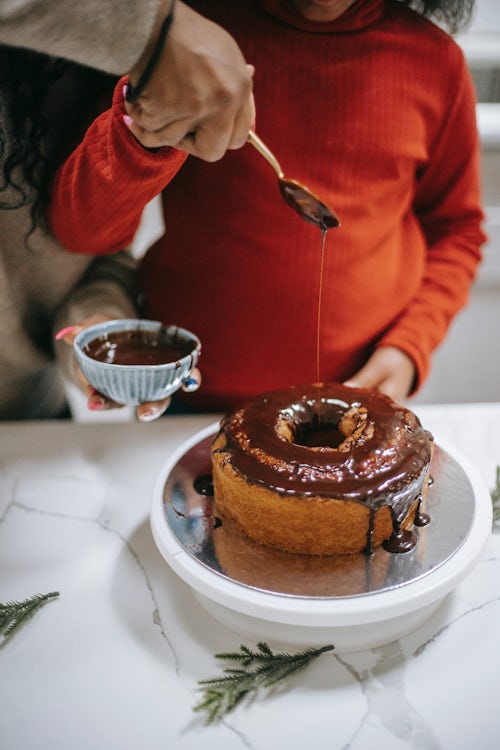
Chocolate
Chocolate is one of the most popular "people foods" that we indulge in over the festive season, but it is a toxic food for dogs. This is due to the theobromine and caffeine content. Dark chocolate is considered the most poisonous type of chocolate for dogs, but milk chocolate and white chocolate can be dangerous too.
Dogs that eat chocolate can suffer vomiting, diarrhoea, increased thirst, panting or restlessness, excessive urination and a racing heart rate. If they ingest very high levels of theobromine and caffeine (or are particularly sensitive to them), symptoms can also include muscle tremors, seizures and heart failure. Dogs have also been known to ingest chocolate wrappers, which can cause damage or obstructions internally.
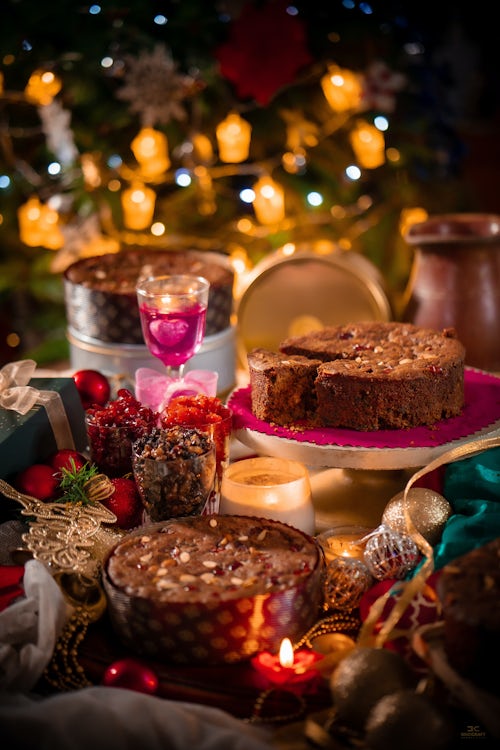
Christmas cakes and puddings containing raisins
Although you should avoid feeding your dog cakes in general, you should take extra care around Christmas. The majority of cakes at this time of year contain raisins, which can cause vomiting, lethargy and even sudden kidney failure in dogs. The same applies to grapes on the festive cheese board, so keep all these tasty treats well out of reach of your dog.
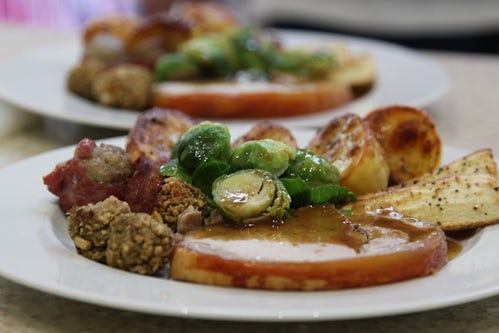
Sage and onion stuffing
Any foodstuffs from the allium family are toxic to dogs. Onions and garlic are the most common types of allium, but shallots and chives are from the same species as well. Garlic is the most dangerous of the alliums, but all varieties should be avoided as they can all cause poisoning in either their cooked or uncooked states. Be particularly careful about onion powder and garlic powder as these common ingredients are more concentrated than their fresh counterparts.
Certain breeds of dog (e.g. Shiba Inus) are more susceptible to suffering adverse effects from ingesting allium plants than others, but they are poisonous to all dogs and should be avoided.
Signs of allium poisoning include vomiting and diarrhoea, but the main effect is red blood cell damage, which can result in anaemia in dogs. The symptoms of allium poisoning may not become apparent for several days after ingestion.
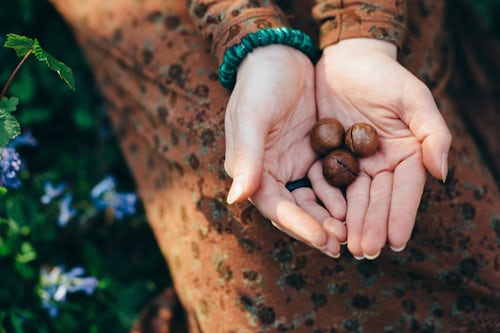
Macadamia nuts
If your dog eats Macadamia nuts it can lead to Macadamia Nut Toxicosis, the clinical signs of which are vomiting, weakness, hyperthermia, depression and muscle tremors. Depending on the severity of your dog's reaction, these symptoms can last between 12 hours and two days. You should always contact your vet if the amount eaten is significant.
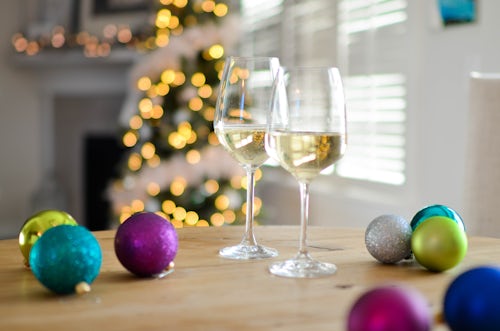
Alcohol
Dogs' livers cannot break down alcohol, so they can suffer from alcohol poisoning in the same way humans do, but they tend to experience it more quickly.
Mild signs of alcohol poisoning in dogs include loss of coordination and weak breathing, but some may go into a coma or even die as a result of helping themselves to any unattended alcoholic drinks, so ensure they're always out of their reach.
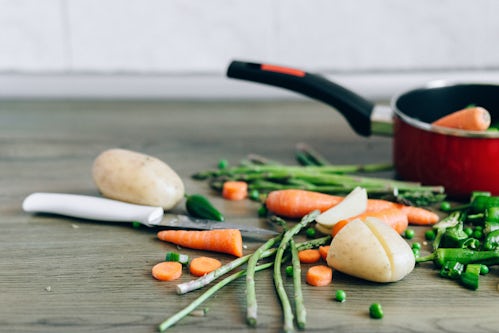
Raw Potatoes
OK, so few of us like to sit by the Christmas tree chomping on a raw potato, but we do love our roasties at Christmas and this means that the uncooked spuds, waste peelings and maybe even potato leaves have the potential to become a stolen snack for dogs. Uncooked potatoes and potato leaves are harmful food for dogs because they contain solanine, a compound that is toxic to your four-legged friend.
Keep uncooked potatoes out of reach of the dog and dispose of the peelings promptly and securely.
Potato Chips and Salty Foods
If you're planning a Christmas drinks party and bulk buying crisps, pretzels and salted peanuts to serve to your guests, make sure they are all positioned well out of reach of your dog on the night. Excessive consumption of salty foods can cause an upset tummy, tremors, a high temperature, seizures and, in extreme cases, even death.
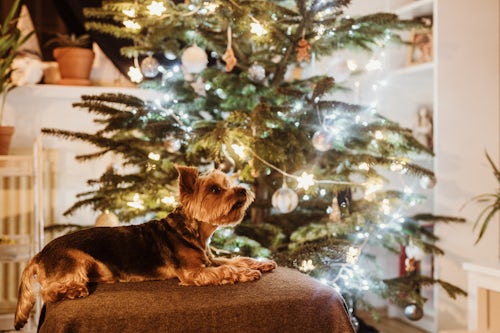
Trees and Plants
If like many other households, you decorate your home with festive greenery over Christmas, it's worth knowing that some of the traditional foliage we use can make your dog ill. A number of popular festive plants can be harmful to your dog. These include:
1. Poinsettia
2. Holly
3. Mistletoe
4. Ivy
5. Potpourri
6. Christmas trees
Poinsettia
If, for some strange reason, your dog takes a liking to a poinsettia plant and decides to eat it over the Christmas holidays, it may cause irritation to their mouth and stomach. This in turn can result in the overproduction of saliva and sometimes vomiting.
Holly
The plant is considered to be of low toxicity, but ingestion of holly berries may result in a stomach upset and the spiky leaves may cause damage to your dog's mouth.
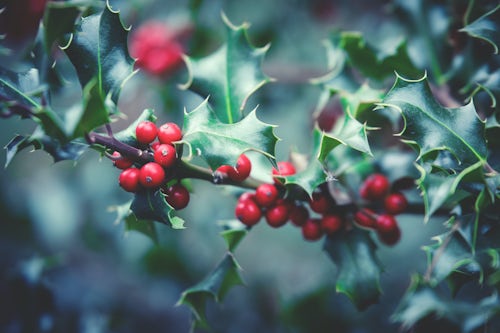
Mistletoe
Both American and European mistletoe varieties contain viscumin, which is a cytotoxin that can cause irritation to the gastrointestinal tract if eaten. Other symptoms of viscumin poisoning include breathing difficulties, erratic behaviour, slowed heart rate and, in some extreme cases, cardiovascular collapse. It may be worth ditching the mistletoe and looking for other ways of getting kisses at Christmas if you share your house with a dog!
Ivy
The ivy that tends to be used in wreaths and decorations is Hedera helix, not Toxicodendron radicans (the American poison ivy) but the Hedera species can still cause an upset stomach when ingested. It can also cause irritant and allergic contact dermatitis if it comes into prolonged contact with the skin.
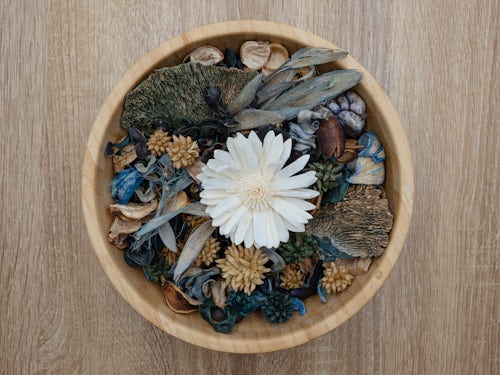
Potpourri
Potpourri can be extremely harmful to dogs, causing sickness and even seizures. The effects may last a number of days and may require a stay at the vets to support their body and avoid dehydration. With this in mind, it’s best to avoid potpourri and opt for a safer alternative, such as a diffuser with a festive scent. If you do happen to have some, ensure that you keep it well out of reach of your pet.
Christmas trees
If your dog decides to eat pine needles this Christmas, they may get a mild tummy upset and experience discomfort and/or internal damage from the sharp needle-like ends.
Decorations and Presents
Imagine having super sensitive senses and being presented with a host of interesting decorations, a tree full of fairy lights and an array of new presents to sniff and explore. It's hardly surprising that Christmas encourages many dogs to get carried away and be overwhelmed by their natural instinct to investigate the unknown.
Some Christmas decorations and presents can be harmful to your dog., so watch out for the following over the Christmas period:
1. Christmas tree decorations (tinsel, baubles, electric lights and salt dough ornaments)
2. Small toys
3. Other hazards (batteries, silica gel and wrapping paper)
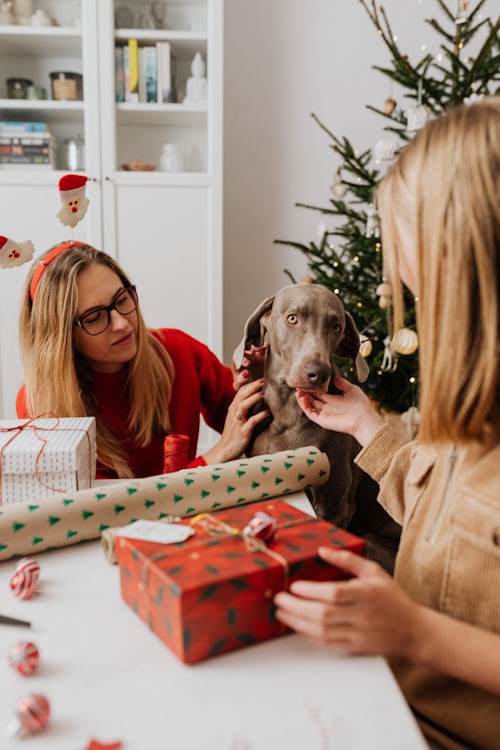
Christmas tree decorations
Decorations made of plastic, paper or foil are of low toxicity, but they may obstruct the stomach if they are ingested. Glass decorations could pose a risk of laceration if chewed or swallowed.
There is a risk that if your dog bites into your Christmas lights they could be electrocuted. If you have lights on your Christmas tree, remember to place them out of reach of your dog and try to keep as much of the cable tucked away or hidden from your dog.
If you have salt dough decorations on your tree, hang them high up, out of reach of your dog, as the high salt content can make your dog ill if they mistake it for a delicious healthy snack. If your four-legged friend does get hold of salt dough, it can make them sick, cause them to drink excessively and appear very tired. In more severe cases it can even cause kidney damage and fits.
Small toys
Board game pieces or any other small toy pieces can be harmful to our dogs. Don’t leave small toys, including those from Christmas crackers, lying on the floor. If your dog does eat one, they should be able to pass it through without issue, but it is quite common for items such as this to lodge in the digestive tract and cause a serious obstruction. If this is the case, it may require surgery to remove. Slightly bigger items pose a serious choking risk.
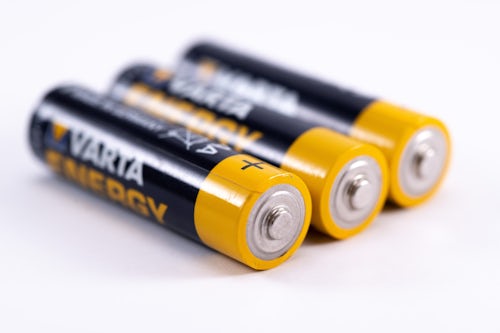
Batteries
If your dog chews and punctures a battery it can cause chemical burns, corrosive lesions or even heavy metal poisoning in very extreme cases. If swallowed whole, batteries are less likely to leak their contents, but could still cause a blockage. This can be very dangerous and may require surgical intervention. If you notice that your dog is vomiting, lethargic, off their food, not defecating or finding it difficult to defecate, this could be an indication that they have a blockage.
Button batteries that become stuck in the throat, or in the gut, can produce an electric current which can significantly damage the surrounding tissue.
Silica gel
Silica gel comes in small sachets and is often found in the packaging of new shoes, handbags, cameras or electrical equipment which we unwrap over Christmas. Although it is labelled “Do not eat” it is chemically and biologically inert, so is unlikely to cause severe symptoms in your dog if it is ingested. The main cause for concern is the packet, which could potentially cause an intestinal blockage, especially in a small dog.

Wrapping or crepe paper
Eating wrapping paper or crepe paper may result in staining in and around the dog's mouth, which may look worrying, but both substances are of low toxicity and so unlikely to be poisonous. Eating a large amount, however, may cause stomach pain and a potentially dangerous blockage in the gut.
HELP! I think my dog has eaten something dangerous.
If you suspect that your dog has eaten something that it shouldn't, get in touch with your vet as soon as possible, even if it means calling the emergency vets on duty or attending the out-of-hours emergency clinic.
Never try to make your dog sick. Inducing vomiting to expel toxins should only be done by a trained veterinarian. Amateur attempts may harm your dog.
The more information you have for the vet, the greater chance their treatment has of being effective. If the vet already has an idea of what they might be dealing with they can explore those potential diagnoses first.
If you struggle to get hold of your vet, try calling the PDSA Animal PoisonLine. This pet poison helpline costs £30 per case (payable over the phone at the time of the call) and is manned by vets, veterinary nurses, toxicologists and scientists. You can talk them through your dog's symptoms, and they can advise whether any further treatment is necessary. This could save you time, stress and non-essential trips to the vet over the festive season.
And finally...
Don't let this list of foods and other risky items make you feel anxious about sharing Christmas celebrations with your dog. Being armed with the knowledge of what you need to look out for, knowing the signs of poisoning (should it occur) and knowing what to do if your dog needs treatment should mean that you can avert most crises before they occur. Even if you have a greedy, inquisitive pooch, Christmas should now be a far more relaxing prospect for you.

.png?ixlib=gatsbyFP&auto=compress%2Cformat&fit=max&w=70&h=70)